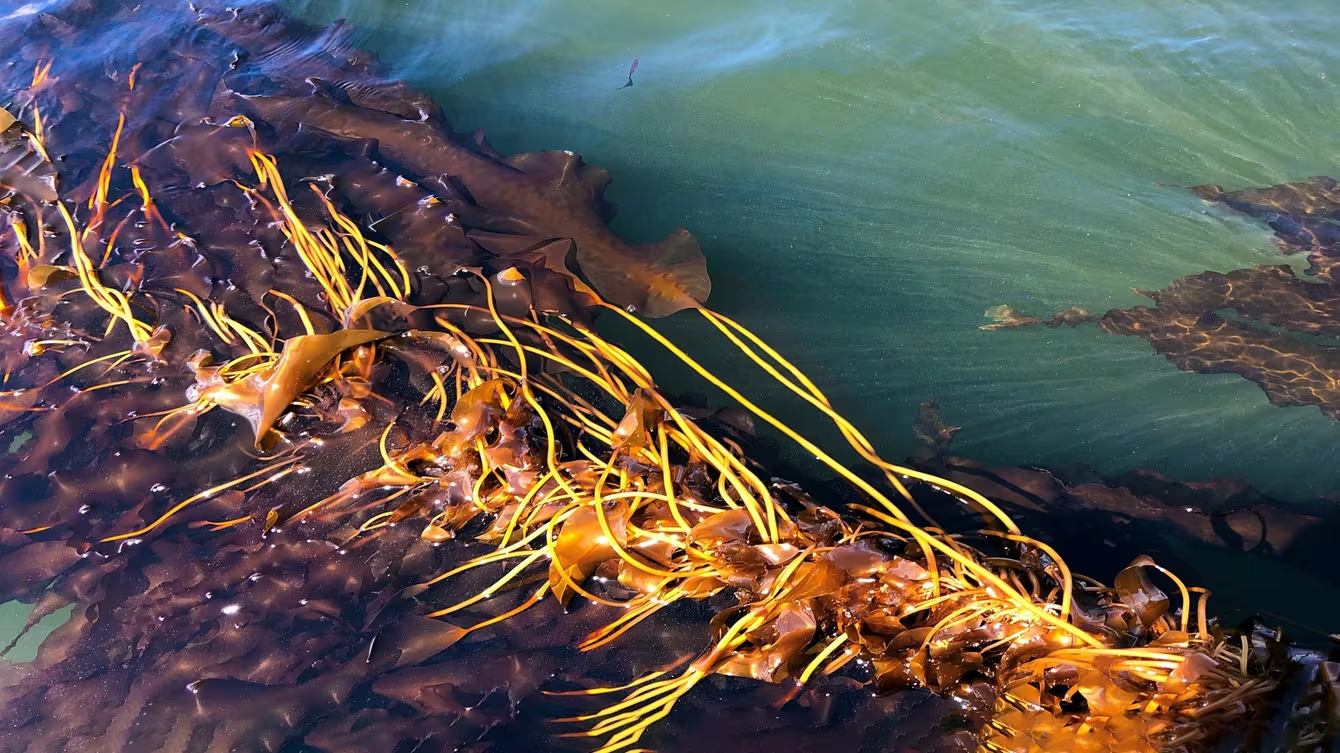The coalition and its steering committee congratulated the awardees and thanked all 71 applicants.
“Since the beginning of this adventure, safety has been at the core of the Safe Seaweed Coalition,” said Philippe Potin, coalition scientific director, of the French National Center for Scientific Research (CNRS). “This has guided the call for proposals and the final selection of awardees.”
Seaweed has significant potential to help build a safe, sustainable and prosperous future. Recognized on a global scale for its potential to mitigate climate change, seaweed also has a role to play in securing global food systems, supporting ocean ecosystems, and creating jobs with potential for economic growth.

© David Bailey, Woods Hole Oceanographic Institution
“We are very proud of the selected projects,” said Vincent Doumeizel, representing United Nations Global Compact (UNGC), co-founders of the coalition. “They will contribute to unlock the full potential of seaweed to contribute to the achievement of the Sustainable Development Goals.”
The funds provided through the coalition aim to contribute to the improvement of safety in the global seaweed sector as the industry scales up and seaweed’s full potential is unlocked. The results of each project funded by the coalition will be made publicly available to maximise global impact of the work, while partnering with seaweed industry stakeholders.
“Lloyd’s Register Foundation is proud to be the founding partner of the Safe Seaweed Coalition. We are looking forward to increasing collaboration and new partnerships with all key stakeholders. We believe that our focus on the safety of seaweed, which must include full consideration of the operational and natural environments, will deliver a scaled-up safe and sustainable seaweed industry addressing the global and urgent challenges our world is facing. This is an exciting journey and we know we will be successful by working together,” said Tim Slingsby, the Lloyd’s Register Foundation representative on the coalition’s steering committee.
The coalition is a global partnership established in March 2021 to support the safety and sustainability of the seaweed industry as it grows, along the entire seaweed value chain. The proposals awarded funding address the coalition’s three safety focus areas: consumer, environmental and operational. This call for proposals was intended to fund sector-building projects to accelerate growth in the seaweed industry, from cultivation through processing to new product development.
The projects and organisations receiving funding from the first call for proposals are listed below, along with a brief description of their intended objectives.
- B’ZEOS AS, the Norwegian organisation aspires to bring food-safe seaweed to commercial markets packaging by addressing legal and regulatory obstacles.
- The Alfred Wegener Institute is implementing the SeaStrains Workshop, a Europe-wide strategy to conserve genetic seaweed resources under the threat of global change through a centralized biobank.
- The Marine Environment and Resources Foundation at the University of the Philippines, is seeking to select and curate safe and healthy eucheumatoids for the continued health of the local seaweed industry.
- Sea PoWer, Tanzania, a seaweed farming innovation for women’s empowerment, working through Aqua-Farms to provide livelihoods for women amidst the challenges presented by climate change.
- The University of Malaya in Malaysia is creating a global taxonomic framework for the carrageenan industry to benefit biobanking, breeding, and quality control.
- The SUBMARINER Network for Blue Growth aims to create a framework for Baltic seaweed biosafety by creating environmental guidance, recommendations, and position papers addressing monitoring and licence conditions for cultivating seaweed in the Baltic Sea.
- The Kelp Forest Foundation is examining the impact of kelp cultivation on biodiversity by using environmental DNA samples from around kelp forests to monitor the changes in biodiversity over time.
- Notpla Limited, a company located in England, will create a pilot program for seaweed-based packaging while providing consumers with information about where and how seaweed used in the biomaterial is produced.
- Ningbo University will provide technical training for seaweed cultivation and safe production through safety manuals, online courses, and workshops for international training purposes.
- Yunus Foundation in Thailand will develop a social business model for the safe and sustainable growth of the local seaweed industry.
- Ocean Farmers is securing the sustainability and safety of the seaweed cultivation industry in Madagascar by collecting, cataloguing, and identifying superior cultivars for commercial production along with a biosecurity policy.
- Banco Español de Algas (BEA – Spanish Bank of Algae) will create a reference collection of seaweed from Macronesia to conserve biological diversity of the local seaweed and ocean life.
- Sea Health Products aims to introduce commercial-scale kelp farming to Australia by developing hatchery techniques for the development of the local seaweed industry.
- Universidad Austral de Chile aspires to characterize and biobank pests and pathogens of pelillo to develop tools that will aid in risk management as related to biosecurity.
- Aber Actives is developing an algal biorefinery using natural marine bacteria.
This call was the first round of multiple calls for proposals planned over three years to distribute £3 million toward research supporting seaweed safety and sustainability. The coalition and its steering committee invite applicants with diverse research and product interests to apply for grants in future calls.
The coalition is coordinated by the CNRS with the help of strategic and funding partner Lloyd’s Register Foundation and the support of United Nations Global Compact. For more information, visit www.safeseaweedcoalition.org.




